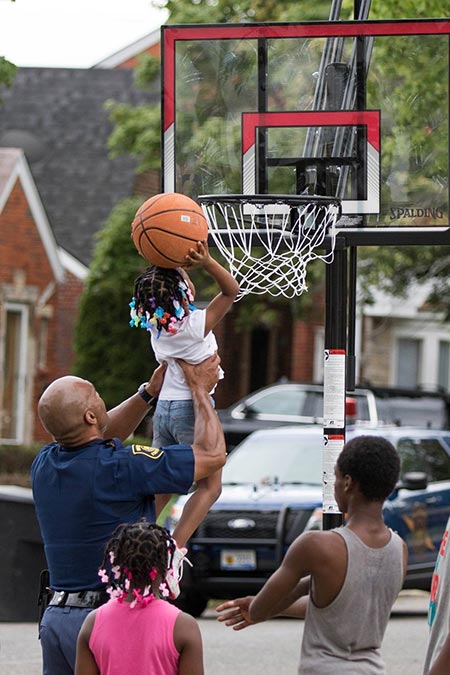Contact Us
To provide feedback on the Community Policing Dispatch, e-mail the editorial board at CPDispatch@usdoj.gov.
To obtain details on COPS Office programs, publications, and resources, contact the COPS Office Response Center at 800-421-6770 or AskCopsRC@usdoj.gov

U.S. Department of Justice
Office of Community Oriented Policing Services
Washington, DC 20530
 The COPS Office is pleased to feature the Michigan State Police (MSP) as the July 2019 winner of the Community Policing in Action Photo Contest. The winning photo features Michigan State Trooper Darzeil Hall engaging in a friendly game of basketball with neighborhood children.
The COPS Office is pleased to feature the Michigan State Police (MSP) as the July 2019 winner of the Community Policing in Action Photo Contest. The winning photo features Michigan State Trooper Darzeil Hall engaging in a friendly game of basketball with neighborhood children.
The Michigan State Police (MSP) handle every corner of the state, from the rural farmlands to the urban inner cities. “We go everywhere,” says Sergeant Martin Miller, who is a 20-year veteran of the MSP. With such an expansive area to cover, reaching the communities is no easy feat, so in 2010 the organization began expanding its efforts in community outreach.
The MSP adopted a community policing model and started the Community Service Troopers (CST) within the Grants and Community Services Division. “We can’t just arrest our way out of trouble in our cities. We have got to help educate and be involved and be a part of those communities that we serve,” says Sgt. Miller.
There are approximately 32 CSTs, who are assigned to regions across the state to help strengthen ties with the community and to serve as the point of contact. “These CSTs are responsible for being that [central figure], so [residents] know who to call and can see a face that they know, instead of just a uniform in the streets,” explains Sgt. Miller. “They are the sounding board and connection to the community.”
 The responsibilities of a CST are numerous. “Anything we can do to help promote safety through the whole community,” says Sgt. Miller. The initiatives range from educating students to building community partnerships, opening lines of communication through community meetings, promoting crime prevention, drug and violence awareness, leading collaborative initiatives within their assigned region, and much more. Miller supervises these efforts and assists the CSTs in the field by distributing the division’s resources and supplies and providing initiatives that involve the communities of Michigan. He also oversees the CAUTION (Community Action United Team in Our Neighborhood) initiative and the Teaching, Educating, and Mentoring (TEAM) School Liaison Program.
The responsibilities of a CST are numerous. “Anything we can do to help promote safety through the whole community,” says Sgt. Miller. The initiatives range from educating students to building community partnerships, opening lines of communication through community meetings, promoting crime prevention, drug and violence awareness, leading collaborative initiatives within their assigned region, and much more. Miller supervises these efforts and assists the CSTs in the field by distributing the division’s resources and supplies and providing initiatives that involve the communities of Michigan. He also oversees the CAUTION (Community Action United Team in Our Neighborhood) initiative and the Teaching, Educating, and Mentoring (TEAM) School Liaison Program.
CAUTION is a faith-based partnership that CSTs lead within their region. Members of all faiths are invited to volunteer and act as a quick response team in times of crisis and to serve as a liaison between law enforcement and residents. “This is a group of community leaders, pastors, [and more,] so when something bad does happen, we have all around communication from the government down to the homeowners,” explains Sgt. Miller. The program fosters an open dialogue and provides a calming influence for residents during critical incidents.
The TEAM program is a part of the educator role that CSTs take on. The program requires comprehensive training that takes 40 hours to complete and introduces more than 30 lesson plans ranging from traditional topics like personal safety to current issues such as social media use. The TEAM initiative is a “two-way street; you have kids moving forward [and learning] and then officers interacting with the city, teaching and [learning themselves].”
The winning photo “really exemplifies what we’ve been doing” with relationship building in the communities. In the photo, Trooper Darzeil Hall partakes in a friendly game of basketball with the children in his patrol region. “You had communities that were at odds with law enforcement. But we started getting into [those regions] and showing a different side of the police,” says Sgt. Miller. The troopers donated a basketball hoop to the children and sponsored a BBQ cookout to reinforce this relationship.
The CSTs have seen success with their community policing initiatives, but there are challenges that come with the job. “We are constantly trying to prove our part within the community, but when we have to be the ‘hard guy’ because an [incident] has happened—it does create a kind of conflict,” explains Sgt. Miller. There are times when a law is broken and force might be needed and “that may be a tough one for a citizen to understand.” But even during those times, Miller recognizes that it all comes back to educating the public and communicating with them about these issues.
“It's a matter of our communication. It has made all the difference. We listen to what [the community members] say. [They] listen to what we have to say, and together through these lines of communication, hopefully, we all come to what the community needs.”
Written with contributions from Michigan State Police Sergeant Martin Miller. Photo courtesy of Michigan State Police.
Subscribe to Email Updates
To sign up for monthly updates or to access your subscriber preferences, please enter your email address in the Subscribe box.






